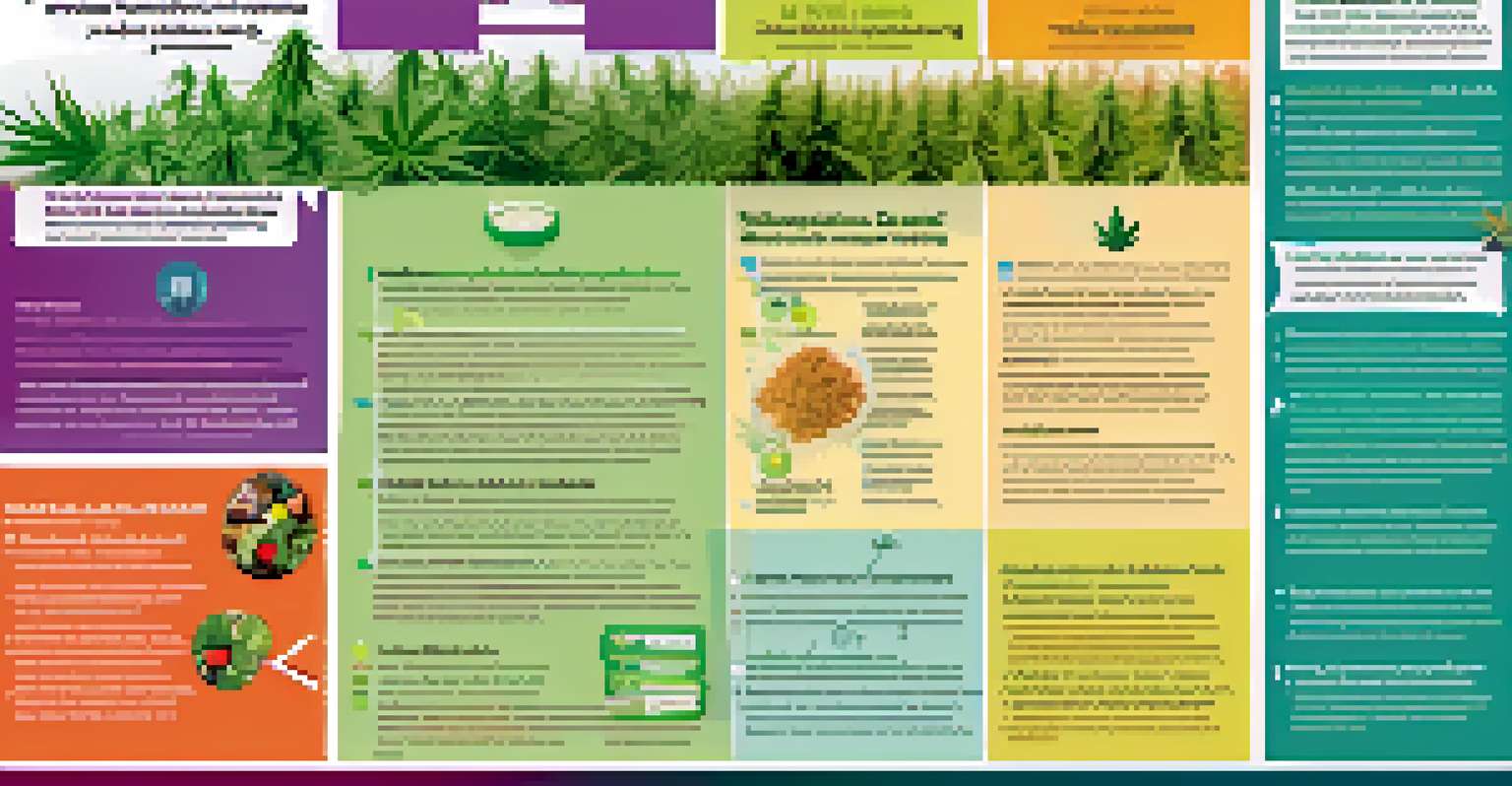Nonprofits Tackling Marijuana Stigma Through Advocacy

Understanding Marijuana Stigma and Its Roots
Marijuana stigma is the negative perception surrounding cannabis use, often rooted in misinformation and historical prejudice. For decades, societal views have been shaped by outdated laws and sensationalized media portrayals that paint cannabis users in a negative light. This stigma can lead to discrimination, affecting individuals' personal and professional lives, and discouraging open conversations about its benefits.
The greatest weapon against stress is our ability to choose one thought over another.
Nonprofits are stepping in to address these misconceptions by providing accurate information and promoting research on cannabis. By highlighting the medicinal properties of marijuana, advocates aim to shift public perception and encourage a more informed dialogue. For example, organizations often share stories of patients who have found relief from chronic pain or anxiety through cannabis products.
Understanding the roots of marijuana stigma is essential for nonprofits as they create targeted advocacy campaigns. By addressing specific misconceptions and presenting clear, factual information, these organizations can foster a more compassionate understanding of cannabis use. This approach not only educates the public but also empowers individuals to share their experiences, further breaking down barriers.
Advocacy Efforts by Nonprofits to Change Perceptions
Many nonprofits are actively working to change perceptions through grassroots advocacy. They organize events, educational seminars, and community forums to engage the public in conversations about marijuana. By creating spaces for discussion, these organizations help individuals feel more comfortable sharing their views and experiences related to cannabis.

One effective strategy used by nonprofits is partnering with local businesses and community leaders to amplify their message. These collaborations can lead to joint initiatives, such as public awareness campaigns that highlight the benefits of responsible cannabis use. For example, some nonprofits have collaborated with health professionals to disseminate credible information about cannabis for therapeutic purposes.
Nonprofits Combat Marijuana Stigma
Through education and advocacy, nonprofits are working to dismantle the negative perceptions surrounding cannabis use.
The shift in perception is gradual, but nonprofits are committed to the long haul. Through consistent advocacy and community engagement, they aim to normalize conversations around cannabis. The more people talk about their experiences and learn from one another, the easier it becomes to dismantle the stigma surrounding marijuana.
Educational Campaigns: Informing the Public on Cannabis
Education is a powerful tool in combating marijuana stigma, and nonprofits are harnessing it through various campaigns. These campaigns often include webinars, social media outreach, and informational pamphlets that debunk myths about cannabis. By providing factual, research-based content, nonprofits can help individuals make informed decisions about marijuana use.
We cannot solve our problems with the same thinking we used when we created them.
For instance, some organizations create engaging content that explains the difference between cannabis and other substances, emphasizing its medicinal benefits. Infographics, videos, and personal testimonials serve to humanize the issue and provide relatable narratives that resonate with the public. This multifaceted approach makes the information accessible and digestible for diverse audiences.
Moreover, educational campaigns often target specific demographics, such as parents or healthcare professionals, tailoring the messaging to address their concerns and questions. By fostering understanding within these groups, nonprofits can create allies who advocate for cannabis acceptance in their circles. Ultimately, education paves the way for more open-minded discussions about marijuana.
The Role of Personal Stories in Advocacy
Personal stories play a crucial role in advocacy efforts by nonprofits as they humanize the issue of marijuana use. When individuals share their experiences with cannabis, it helps to break down preconceived notions and fosters empathy among listeners. These narratives often illustrate the transformative impact that cannabis can have on people’s lives, whether for medical or recreational purposes.
Nonprofits frequently use storytelling in their campaigns, showcasing real-life testimonials from patients, caregivers, and advocates. These stories can be powerful catalysts for change, prompting others to reconsider their views on marijuana. By creating platforms for these voices to be heard, nonprofits encourage a diverse range of perspectives and experiences.
Personal Stories Drive Change
Sharing personal experiences with cannabis helps humanize the issue and fosters empathy, encouraging open conversations.
The emotional resonance of personal stories can also aid in building community support for cannabis reform. When people hear firsthand accounts of individuals benefiting from cannabis, it challenges the stigma and encourages more open dialogues. This collective sharing of experiences helps to create a sense of solidarity and belonging among those advocating for cannabis acceptance.
Legislative Advocacy: Pushing for Policy Change
Nonprofits are also actively involved in legislative advocacy to promote policy change related to marijuana. This includes lobbying for laws that decriminalize cannabis, increase access to medical marijuana, and support research initiatives. By working alongside lawmakers, nonprofits can help shape policies that reflect the realities of cannabis use and its benefits.
These organizations often mobilize supporters to participate in grassroots campaigns, encouraging them to contact their representatives. This call to action can amplify the voices of those who support cannabis reform, ensuring that lawmakers understand the public's stance on the issue. Advocacy days, where supporters gather to advocate for specific policies, are common strategies used to create momentum.
Through persistent advocacy efforts, nonprofits aim to dismantle the legal barriers surrounding marijuana. By pushing for sensible legislation, they can help create a framework that allows for responsible use and acceptance of cannabis in society. Legislative change is a significant step toward reducing stigma and fostering a more informed public.
Collaborations with Health Professionals for Credibility
Collaborating with health professionals lends credibility to the advocacy efforts of nonprofits focused on marijuana. By partnering with doctors, researchers, and mental health experts, these organizations can present well-rounded, scientifically-backed information about cannabis. This collaboration helps to bridge the gap between medical communities and the general public, fostering trust and understanding.
Health professionals can share their expertise on the therapeutic benefits of cannabis, dispelling myths and misconceptions held by the public. These partnerships often lead to educational initiatives, such as community workshops where medical professionals discuss the science behind cannabis. This not only enhances the credibility of the message but also encourages informed conversations around cannabis use.
Collaborations Enhance Credibility
Partnering with health professionals allows nonprofits to provide scientifically-backed information, building trust with the public.
Furthermore, by involving health professionals in advocacy efforts, nonprofits can ensure that their messaging aligns with medical standards and research. This alignment is crucial for addressing concerns about safety and efficacy, helping to establish a foundation of trust. Ultimately, these collaborations contribute to a more informed public, paving the way for broader acceptance of cannabis.
The Impact of Nonprofits on Shifting Public Perception
Nonprofits have a significant impact on shifting public perception of marijuana through their persistent advocacy and educational efforts. By challenging stereotypes and sharing factual information, they are gradually changing the narrative around cannabis. This shift is evident in changing laws, increased public support for legalization, and a growing acceptance of cannabis use.
Surveys and studies have shown that as people become more informed about cannabis, their attitudes towards it begin to shift positively. Nonprofits play a critical role in this process by providing platforms for discussion and community engagement. Their efforts help to normalize conversations around cannabis, creating a ripple effect that influences broader societal attitudes.

As more individuals advocate for cannabis acceptance, the stigma surrounding marijuana continues to diminish. The commitment of nonprofits to foster understanding and dialogue is crucial in this ongoing transformation. Their work not only supports those who use cannabis but also contributes to a more inclusive and open-minded society.